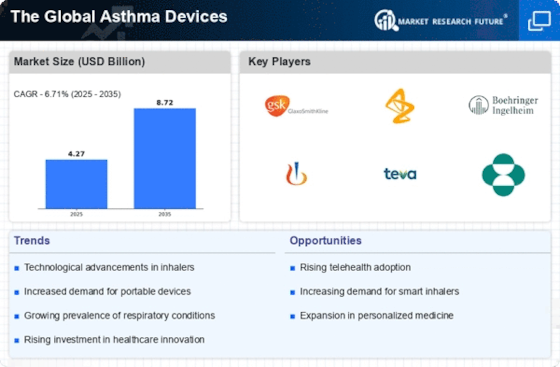-
Definition
-
Scope of the Study
- Research Objective
- Assumptions
- Limitations
-
Introduction
-
Primary Research
-
Secondary research
-
Market Size Estimation
-
Drivers
-
Restrains
-
Opportunities
-
Challenges
-
Macroeconomic Indicators
-
Technology Trends & Assessment
-
Porters Five Forces Analysis
- Bargaining Power of Suppliers
- Bargaining Power of Buyers
- Threat of New Entrants
- Threat of Substitutes
- Intensity of Rivalry
-
Value Chain Analysis
-
Investment Feasibility Analysis
-
Pricing Analysis
-
Chapter 6. Global Asthma Devices Market, by Type
-
Introduction
-
Inhalers
- Metered-Dose Inhalers
- Dry Powder Inhalers
- Others
-
Market Estimates & Forecast, 2020-2027
-
Nebulizers Market Estimates & Forecast, 2020-2027
- Compressor Nebulizers
- Ultrasonic Nebulizers
- Mesh Nebulizers
- Others
-
Others
-
Chapter 7. Global Asthma Devices Market, by Technology
-
Introduction
-
Manually Operated Inhaler Devices Market Estimates & Forecast, 2020-2027
-
Digitally Operated Inhaler Devices Market Estimates & Forecast, 2020-2027
-
Others
-
Chapter 8. Global Asthma Devices Market, by End Users
-
Introduction
-
Hospitals & Clinics Market Estimates & Forecast, 2020-2027
-
Retail Pharmacies Market Estimates & Forecast, 2020-2027
-
Home Care Market Estimates & Forecast, 2020-2027
-
Others
-
Chapter 9. Global Asthma Devices Market, by Region
-
Introduction
-
America
- North America
- South America
-
Europe
- Western Europe
- Eastern Europe
-
Asia Pacific
- Japan
- China
- India
- Australia
- Republic of Korea
- Rest of Asia Pacific
-
The Middle East & Africa
- United Arab Emirates
- Saudi Arabia
- Oman
- Kuwait
- Qatar
- Rest of the Middle East & Africa
-
Chapter 10. Company Landscape
-
Introduction
-
Market Share Analysis
-
Key Development & Strategies
- Key Developments
-
Chapter 11 Company Profiles
-
GlaxoSmithKline plc.
- Company Overview
- Type Overview
- Financials
- Key Developments
- SWOT Analysis
-
Merck & Co., Inc.
- Company Overview
- Type Overview
- Financial Overview
- Key Developments
- SWOT Analysis
-
3M
- Company Overview
- Type Overview
- Financial Overview
- Key Development
- SWOT Analysis
-
Aristopharma Ltd.
- Company Overview
- Type/Business Segment Overview
- Financial Overview
- Key Development
- SWOT Analysis
-
SRS PHARMACEUTICALS PVT. LTD.
- Company Overview
- Type Overview
- Financial overview
- Key Developments
- SWOT Analysis
-
AstraZeneca
- Company Overview
- Type Overview
- Financial Overview
- Key Developments
- SWOT Analysis
-
Baxter
- Overview
- Type Overview
- Financials
- Key Developments
- SWOT Analysis
-
Boehringer Ingelheim GmbH
- Overview
- Type Overview
- Financials
- Key Developments
- SWOT Analysis
-
Koninklijke Philips N.V.
- Overview
- Type Overview
- Financials
- Key Developments
- SWOT Analysis
-
Others
-
Chapter 12 MRFR Conclusion
-
Key Findings
- From CEO’s View Point
- Unmet Needs of the Market
-
Key Companies to Watch
-
Prediction of Global Asthma Devices Market
-
Chapter 13 Appendix
-
LIST OF TABLES
-
Global Asthma Devices Industry Synopsis, 2020-2027
-
Global Asthma Devices Market Estimates and Forecast, 2020-2027, (USD Million)
-
Global Asthma Devices Market by Region, 2020-2027, (USD Million)
-
Global Asthma Devices Market by Type, 2020-2027, (USD Million)
-
Global Asthma Devices Market by Technology, 2020-2027, (USD Million)
-
Global Asthma Devices Market by End Users, 2020-2027, (USD Million)
-
North America Global Asthma Devices Market by Type, 2020-2027, (USD Million)
-
North America Global Asthma Devices Market by Technology, 2020-2027, (USD Million)
-
North America Global Asthma Devices Market by End Users, 2020-2027, (USD Million)
-
U.S. Global Asthma Devices Market by Type, 2020-2027, (USD Million)
-
U.S. Global Asthma Devices Market by Technology, 2020-2027, (USD Million)
-
U.S. Global Asthma Devices Market by End Users, 2020-2027, (USD Million)
-
Canada Global Asthma Devices Market by Type, 2020-2027, (USD Million)
-
Canada Global Asthma Devices Market by Technology, 2020-2027, (USD Million)
-
Canada Global Asthma Devices Market by End Users, 2020-2027, (USD Million)
-
South America Global Asthma Devices Market by Type, 2020-2027, (USD Million)
-
South America Global Asthma Devices Market by Technology, 2020-2027, (USD Million)
-
South America Global Asthma Devices Market by End Users, 2020-2027, (USD Million)
-
Europe Global Asthma Devices Market by Type, 2020-2027, (USD Million)
-
Europe Global Asthma Devices Market by Technology, 2020-2027, (USD Million)
-
Europe Global Asthma Devices Market by End Users, 2020-2027, (USD Million)
-
Western Europe Global Asthma Devices Market by Type, 2020-2027, (USD Million)
-
Western Europe Global Asthma Devices Market by Technology, 2020-2027, (USD Million)
-
Western Europe Global Asthma Devices Market by End Users, 2020-2027, (USD Million)
-
Eastern Europe Global Asthma Devices Market by Type, 2020-2027, (USD Million)
-
Eastern Europe Global Asthma Devices Market by Technology, 2020-2027, (USD Million)
-
Eastern Europe Global Asthma Devices Market by End Users, 2020-2027, (USD Million)
-
Asia Pacific Global Asthma Devices Market by Type, 2020-2027, (USD Million)
-
Asia Pacific Global Asthma Devices Market by Technology, 2020-2027, (USD Million)
-
Asia Pacific Global Asthma Devices Market by End Users, 2020-2027, (USD Million)
-
Middle East & Africa Global Asthma Devices Market by Type, 2020-2027, (USD Million)
-
Middle East & Africa Global Asthma Devices Market by Technology, 2020-2027, (USD Million)
-
Middle East & Africa Global Asthma Devices Market by End Users, 2020-2027, (USD Million)
-
LIST OF FIGURES
-
Research Process
-
Segmentation for Global Asthma Devices Market
-
Market Dynamics for Global Asthma Devices Market
-
Global Asthma Devices Market Share, by Type 2020
-
Global Asthma Devices Market Share, by Technology 2020
-
Global Asthma Devices Market Share, by End Users, 2020
-
Global Asthma Devices Market Share, by Region, 2020
-
North America Global Asthma Devices Market Share, by Country, 2020
-
Europe Global Asthma Devices Market Share, by Country, 2020
-
Asia Pacific Global Asthma Devices Market Share, by Country, 2020
-
Middle East & Africa Global Asthma Devices Market Share, by Country, 2020
-
Global Asthma Devices Market: Company Share Analysis, 2020 (%)
-
GlaxoSmithKline plc.: Key Financials
-
GlaxoSmithKline plc.: Segmental Revenue
-
GlaxoSmithKline plc.: Geographical Revenue
-
Merck & Co., Inc.: Type UK Ltd: Key Financials
-
Merck & Co., Inc.: Type UK Ltd: Segmental Revenue
-
Merck & Co., Inc.: Type UK Ltd: Geographical Revenue
-
3M: Key Financials
-
3M: Segmental Revenue
-
3M: Geographical Revenue
-
Aristopharma Ltd.: Key Financials
-
Aristopharma Ltd.: Segmental Revenue
-
Aristopharma Ltd.: Geographical Revenue
-
SRS PHARMACEUTICALS PVT. LTD.: Key Financials
-
SRS PHARMACEUTICALS PVT. LTD.: Segmental Revenue
-
SRS PHARMACEUTICALS PVT. LTD.: Geographical Revenue
-
AstraZeneca: Key Financials
-
AstraZeneca: Segmental Revenue
-
AstraZeneca: Geographical Revenue
-
Baxter.: Key Financials
-
Baxter.: Segmental Revenue
-
Baxter.: Geographical Revenue
-
Boehringer Ingelheim GmbH: Key Financials
-
Boehringer Ingelheim GmbH: Segmental Revenue
-
Boehringer Ingelheim GmbH: Geographical Revenue
-
Koninklijke Philips N.V.: Key Financials
-
Koninklijke Philips N.V.: Segmental Revenue
-
Koninklijke Philips N.V.: Geographical Revenue


















Leave a Comment